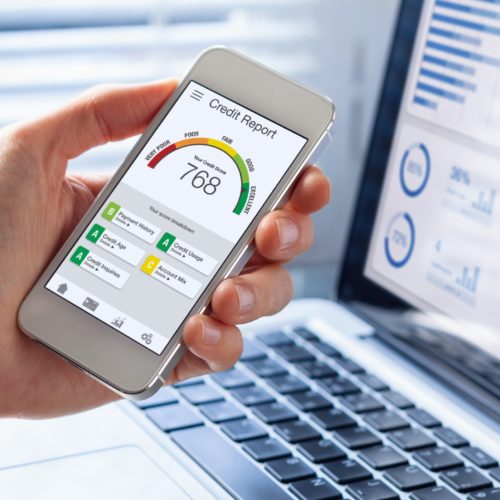Having a low credit score can make your life much more difficult and much more stressful.
That three-digit number is used by banks and other creditors and is essentially a measure of the likelihood that you will pay your debts. In the eyes of banks and other creditors, it is an indicator of how trustworthy you are.
Having a high credit score (being more trustworthy) will provide you with significantly better financial opportunities.
You will get more favorable terms and lower interest rates on mortgage loans, car loans, credit cards, and all other credit products than you would with a lower credit score.
Know Your Credit Score Range
The FICO credit score ranges from 300 – 850. The following is a breakdown of how certain scores are graded:
- Exceptional: 800+
- Very Good: 740-799
- Good: 670-739
- Fair: 580-669
- Poor: 300-579
The average FICO score, according to Experian from data from the second quarter of 2019 is 703 – which, with all things considered, is pretty good.
Experian also published the following breakdown of average credit score by age group:
- 20-29: 662
- 30-39: 673
- 40-49: 684
- 50-59: 706
- 60+: 749
So, where do you fall? Are you above or below average for your age group?
Knowing your score and keeping up to date on your credit report is extremely important to ensure there is nothing fraudulent going on in your name.
There are several free apps and tools offered by banks to help you regularly check your score.
Having good financial habits and knowing what affects your credit score and how to increase your credit score is extremely important to your financial well-being in the long term.
How Can I Raise My Credit Score In 30 Days?
Raising your credit score is typically a long-term task. The biggest and most important factors in determining your score, typically take the longest.
However, there are a few quick fixes that can help you get a little boost in less than 30 days:
1. Pay Off Any Balances Over 30% of Your Credit Limit
If your total credit limit is $10,000, but you’re using $8,000 of it. You may want to consider chopping away at your outstanding balance.
Ideally, you should aim to be between 0-10% of your total credit limit. This is considered excellent by many of the major credit score tracking companies and will gain you the most points the quickest.
However, remember that using some credit is better than none, so really, you should aim for 1-10%.
If you are using too much of your credit, you may not have enough left available when you need it. Using a high percentage of your available credit is an indicator to lenders that you may have overextended and will be unable to pay them back.
2. Get Late Payments Removed
This one won’t be so simple. If you’ve recently made a payment a few days late, your card company will likely have filed a report that will be weighing on your credit score.
Working with your card company is the easiest way to get this removed.
Sometimes, they may do some negotiating and require you to do something, such as setting up monthly autopay.
If you can get your late payments removed and start to pay on time every month, you could very quickly boost your credit score.
3. Increase Your Credit Limit
This one goes hand-in-hand with the first tip. We already talked about how important it is to be using 30% or less of your total credit every month.
If you find every month you are over this threshold; you might want to consider bumping up your credit limit.
If every month you are using $3,000 or more of your $10,000 credit limit, increasing your limit to $15,000-$20,000 will bring you below that 30% limit.
Additionally, it will show lenders that you have more capacity or access to capital if you ever need it in the future.
Remember, just because your credit limit increases, it doesn’t mean you have to go and use it all.
How Long Will It Take To Repair My Credit History?
The unfortunate answer to this question is, it depends. Some experts say it could take anywhere from 3-6 months; however, depending on your circumstances and how damaged your credit is, it could take a year if not longer.
It is important to keep in mind that your credit score is just a measure of trust that banks and other financial institutions have in you. Much like your friendships, if someone breaks your trust, they don’t simply earn it back by saying, “Oops, sorry.” It takes time to build that trust back up, and the same goes for your credit score.
Things that affect your score negatively, like late payments and collections, stay on your credit report for up to seven years. Other things like bankruptcy remain on your report for as long as 10 years.
Here are a few things you can do to stop the bleeding and get your credit score back on track:
Review Your Credit Report
The first step to fixing your credit score problem is to download your credit report and figure out what is dragging your score down.
You can download your reports from annualcreditreport.com after making an account and answering some questions about yourself.
You should get into the habit of doing this at least annually to make sure nothing strange is popping up on your reports.
Once you have the reports downloaded, go over every detail and verify each mark or event for accuracy. If it is inaccurate, then you need to make sure it gets removed. You will need to submit dispute letters to the credit bureaus to do this along with financial records to prove these events are not accurate.
Fix Your Current Credit Issues
Now that you have your credit history scrubbed and accurate, you need to clean up your current credit issues.
Maybe you have a few late credit card payments. Perhaps you’re behind on your mortgage payments.
Maybe you failed to pay property or income taxes for the last few years. Whatever it is, you need to catch up on all late payments as fast as you possibly can.
These issues will remain on your report for up to 7 years; however, paying them off will at least change them from unpaid to paid on your credit reports. This is extremely important to repair your credit. If you don’t do this, all other efforts will be for nothing.
Think of it as a sinking boat. You need to find the source of the problem and plug the hole before you start shoveling water out or it will just keep filling up.
Fix Your Credit Habits
You could use every possible credit repair tactic out there, but if you don’t fix your credit habits, you will always be trying to fix your credit score rather maintain it.
The best piece of advice for anyone using a credit card is never to spend more than what you have in your bank account today.
Earlier, we talked about working on getting late payments removed from your credit report and limiting your credit usage to no more than 30% of your credit limit.
This means that if you have a $10,000 credit limit, you shouldn’t use any more than $3,000. However, if you only have $1,500 in your bank account, the absolute most you should be spending on your credit card is $1,500.
Never spend more than you have!
If you can follow that simple rule, you should never have credit problems.
What Makes Your Credit Score Go Down?
Credit scores change all the time, so if you notice a sudden drop in your score, it doesn’t necessarily mean you should immediately panic.
There are a lot of things that can make your credit score go down. The most common include:
Late or Missed Credit Card Payments
The most important thing for building credit is making on-time payments.
If you miss any payments or make any late payments, your credit score will drop. Luckily, this is one you can very easily control.
Using More Than 30% of Your Credit Limit
You may have a lot of available credit, but you shouldn’t be using all of it. Only use what you can immediately afford.
It will not only help you be more financially responsible, but it will help boost your credit score. Aim to use between 1-10% of your available credit.
Late Rent or Mortgage Payment
Just as missing credit card payments affect your credit score, so does missing rent or mortgage payments. Unfortunately, making rent payments doesn’t always help your credit score go up, only down if you miss a payment.
Luckily, some banks and other financial institutions are working to make sure these events can positively impact your credit score.
Recently Applied For a New Loan, Mortgage, or Credit Card
Your credit score will also drop if you apply for a new loan, mortgage, or credit card. Every time you authorize someone else to pull your credit report, a hard inquiry will be filed and will negatively impact your credit score for up to two years.
It is important to not apply for credit all the time. The goal is to aim for no more than 1-2 new inquiries every two years.
Recently Closed a Credit Card
If you have recently closed a credit card, you may also notice that your score has dropped. This is due to a few things.
The first is that your overall credit limit will decrease and increase your credit usage. The second is that you are taking away from your credit history.
A big factor in your score is how long you have been using credit. The longer you’ve been using the credit card, the better (as long as you have been responsible with your credit). Canceling a card will shorten that credit history.
Inaccurate Information on Your Credit Report
If there is incorrect information on your credit report, you will see a negative impact.
You will need to fix these issues as soon as possible to help your credit history get back on the right path.
How Can I Raise My Credit Score 100 Points?
Raising your credit score 100 points may seem like an impossible task. But, employing all of these tactics we discussed, building healthy credit habits, and being patient will make this a straightforward and easy task.
It won’t be an overnight thing. Sure there are quick boosts to your credit score like paying off overdue balances or reducing your total credit usage. But the things that have the most significant impact on your credit score, take the longest.
Most credit tracking companies consider having a line of credit for seven years or more to be excellent.
Making your payments on time, monitoring your usage, occasionally checking your reports for errors, and not opening too many new accounts will raise your credit score 100 points. You need to have patience and trust the process.






Read 1 comment or add your own
Read Comments